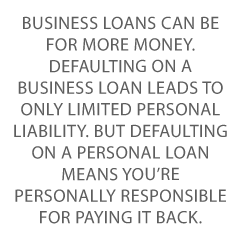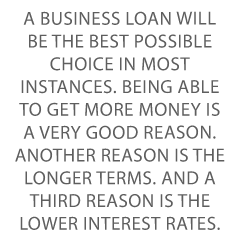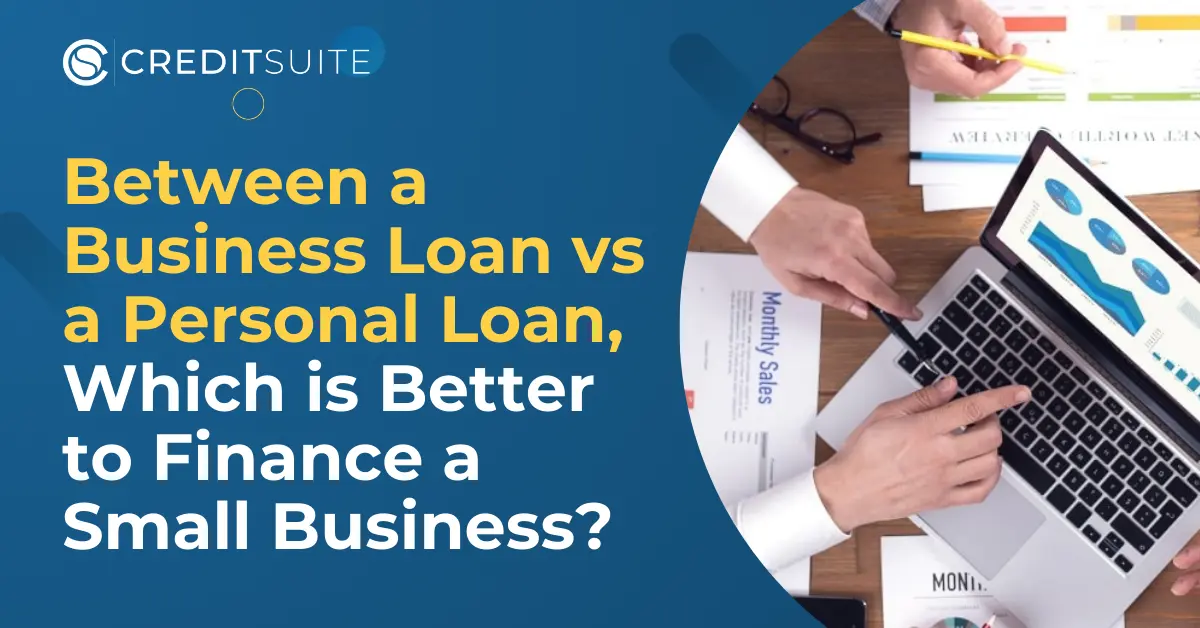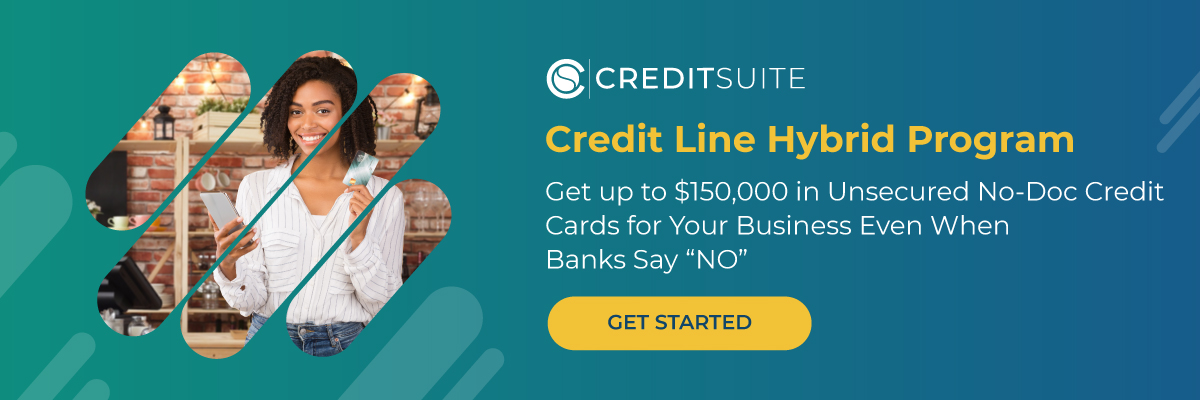Can I use a Personal Loan for Business?
Yes, absolutely!
So long as the lender has not added any restrictions on your use of the funds, then you can use the money you borrow for any purpose whatsoever.
If the personal loan application form asks about the purpose of the loan, of course, be honest and let them know it is going to be used for your small business.
If there are any limitations on your use of the money from a personal loan, and it ends up you cannot use it for business purposes, then there’s one perfect remedy—just get a personal loan from a different lending institution.
Is it Harder to get a Business Loan than a Personal Loan?
It is definitely harder to get a business loan as opposed to a personal loan.
While a personal loan will often only need your personal credit score and personal financial information, a business loan application will ask for all of those items and more.
Business loan applications will call for your business plan, small business financials, tax returns, and information from your business bank account.
This is understandable, as business loans are for more money. Lending institutions want to be sure a small business has good cash flow and can pay any loan back on time.
Is Business Loan Different from Personal Loan?
Business loans tend to have a lower interest rate and can often be for a longer term—although there are some exceptions to that. Furthermore, you can usually get a lot more money with a business loan vs a personal loan.
A personal loan is usually easier to apply for. You are also more likely to get your money faster with a business loan, although online lenders are changing that, and are fulfilling business loans a lot faster than the norm.
Business loans will provide some protection to your personal assets, but if you provide a personal guarantee, that protection will be lost.
When considering a business loan vs personal loan, your main considerations should be the length of time for repayment, terms, interest rates, fees, and consequences.
That is the consequence of paying late, or not paying at all.
In short, what can you least afford to lose?
What is the Difference between a Business Loan and Personal Loan?
Generally, a personal loan for a business is easier to get than a business loan. It’s often an unsecured loan. Unlike with secured loans, you don’t need collateral.
However, the interest rate for a consumer loan for a business is higher than for a business loan.
Repayment terms can be shorter—although company financing like hard money loans has extremely short repayment terms, like a business version of a payday loan.
 Business loans can be for more money. Defaulting on a business loan leads to only limited personal liability. But defaulting on a personal loan means you’re personally responsible for paying it back.
Business loans can be for more money. Defaulting on a business loan leads to only limited personal liability. But defaulting on a personal loan means you’re personally responsible for paying it back.
And, your personal credit takes a hit.
Difference 1 — Personal Responsibility Varies
No matter what, the entity responsible for paying back a personal loan for a business is always a person. Namely, you.
If the business fails to pay back the personal loan, then the individual will have to shoulder all of the responsibility. And a failed business that leaves debts in its wake can profoundly affect personal finances for years to come.
With a business loan, personal responsibility is limited. However, there is one rather notable exception to this.
Offering a personal guarantee will put you, the individual, on the hook. Yes, even for a business loan.
Since many business loans are secured loans requiring some form of collateral, the lender will take that first when seeking repayment on a defaulted loan. For the sake of your personal finances, you had best make sure that it’s business collateral, such as equipment.
It can be hard for startups to come up with sufficient business collateral. They are a lot less likely to qualify for an unsecured business loan.
Difference 2 — Payback Terms Are Not The Same
A personal loan, even for business (we are not talking about a home loan, or a HELOC here), will have terms of about twelve to sixty months.
But business financing is all over the place. Hard money loans and invoice factoring can clock in at payback terms that are only a few weeks long. While a loan for commercial real estate from the SBA can have payback terms of up to twenty-five years.
This will, in turn, mean that monthly payments will differ. And so will the effects of interest compounding. A shorter loan term will work out to heftier payments every month. But a longer payback term will afford more opportunities for interest to compound.
Business owners might also want to look into online lenders to see if they can get longer payback periods, particularly if they are not going to qualify for a Small Business Administration loan.
Difference 3 — The Ease With Which You Can Get a Loan Differs
For a personal loan, a lender will most likely only want to look at your personal credit score and history, and your personal finances. This can mean personal tax returns.
A lender on the personal side may also have minimum income requirements. But they will not necessarily divulge them to the borrower. A borrower can potentially receive a personal loan denial and not be able to find out why.
But when it comes to a business loan, a lender is going to want to review:
- Personal credit
- Business credit
- Your business plan
- Other business financial records such as bank statements, tax returns, and profit and loss statements
However, you should always shop around and check with a variety of lenders. An online lender may have less stringent application requirements than a traditional lender.
For the SBA on the other hand, the document requirements can be even more complicated and burdensome. In addition, individual SBA lenders will have their own lending documentation requirements.
Difference 4 — The Opportunity to Build a Business Credit History is a Major Difference
With a small business loan, a corporation can build business credit and get a business credit card or several credit cards to cover business expenses.
Since paying on time is the most important factor in a business’s credit score, a business can improve bad credit tremendously by not paying late.
A personal loan doesn’t build a credit history for a business to get any credit cards. A raft of perfect on-time payments is a great achievement. But it does nothing to grow a company’s credit score and get credit cards.
For a business interested in growing credit to get at least one credit card for business expenses, a small business loan is a perfect way to promote such a goal. That is, so long as the business pays the loan back faithfully and on time.
Since better company credit leads to more and better financing opportunities, building company credit and getting at least one credit card for business expenses is an important goal.
Difference 5 — The Speed of Funding Varies
The Small Business Administration, in particular, takes its time before you will see any of the money. As in, a few months.
Other, more traditional business lenders, especially for term loans, may also take weeks or months before you ever see a dime. If you are looking for business financing and time is of the essence, a small business loan is, in general, not a good working capital loan option.
A personal loan, though, can potentially furnish you with funding in one business day.
Online business lenders, on the other hand, are starting to change this situation and turn it on its head. For a smaller loan amount, if a business readily qualifies, sometimes they can get a business loan in a matter of days.
This has enhanced the competition between lenders in the business space. And it has added some blurriness to the distinctions between these types of loans.
Pros of Personal Loan
A personal loan has a few positives which any business owner should take into consideration.
The lack of complication in applying is very appealing, particularly to owners of startup ventures. A young business most likely will not have extensive professionally-prepared documents. It may not have even paid quarterly taxes yet!
A very new business venture might not have a plan yet, either—but a personal loan issuer will not be looking for that kind of document.
For such a company, a personal loan is the better choice.
The same goes for how quickly a business can get financing. If a corporation must act quickly in order to secure a deal, a personal loan will usually be faster.
Because being accepted for a personal loan does not involve checking company credit, a company does not have to have a corporate credit score. In fact, it does not even have to have a credit report with a business credit bureau like Dun & Bradstreet.
Again, for a startup, this is another one for the plus column for personal loans for business. It is also a positive for sole proprietors and partnerships, neither of which is a separate entity to build a corporate credit history.
Cons of a Personal Loan
Personal responsibility looms large with any personal loan. This is the case regardless of a company’s particular business entity. Corporation, partnership, or sole proprietor, it does not matter.
If you default on a personal loan, it is your responsibility to pay it back. There is no protection for your personal assets. And, to add insult to injury, a default will also adversely affect your personal credit score.
Being unable to build company credit is another one for the minus column. A business can have a stellar history of paying back a personal loan for business. But it will do nothing for their PAYDEX or any other corporate credit score.
Shorter payment terms, plus a higher personal loan interest rate (probably not as bad as for a typical student loan), mean a monthly payment for even the best personal loan will be higher than for a business loan.
Being unable to borrow as much is another negative. Businesses often need very large amounts of money, to put down on land or purchase equipment, or buy several big-ticket items to sell, like luxury cars.
A lower loan amount is a major disadvantage. If you cannot adequately cover business expenses, a personal loan will be an inferior choice.
Pros of Business Loan
The pros of a business loan come under four separate areas:
- Payback terms
- Interest rates and fees
- Loan amount
- The ability to build business credit
Payback terms can be longer with a business loan, but that will depend on the type of loan a business owner gets. Term loans are usually more generous with payback dates. But the payback time for invoice factoring and hard money loans can be measured in weeks.
Often, interest rates are lower for business loans. Fees will vary, depending on the lender, but a company already working with a lender (say, they have a business checking or savings account there) may see fees lessened or waived altogether.
Businesses have a greater need for capital, and so business lenders act accordingly. This means more money is available with a business loan.
Business credit can help businesses get funding and better corporate credit will get them even more cash and more options. If a company can build company credit through the simple act of paying back a debt they were going to incur anyway, why not do so?
Using current small business funding to build business credit to get even better business funding in the future is a smart move.
Cons of a Business Loan
But there are some downsides to taking a business loan rather than a personal loan for business. These generally come down to the speed of funding and ease of application.
Personal loans can get money into a business owner’s pocket within one business day. But business loans can often take longer—far longer. An SBA loan can take months to get the cash to an entrepreneur. Other business loans can take weeks.
A personal lender is going to want to see the personal financials and the personal credit score of the business owner.
But a small business lender is going to want all of that, plus business credit scores, a plan, business financials, business tax returns, information from the business bank account, and possibly even more.
Another downside to business loans is when you use a PG. For a regular business loan, there is some protection of your private assets if your business defaults. But a PG reverses all that.
Because using a PG erases this advantage of business loans, personal guarantees should be used strategically. Give one up if you must, but only do so for the most money as possible, at the best terms you can find.
Should you get a Business Loan or a Personal Loan?
A business loan will be the best possible choice in most instances. Being able to get more money is a very good reason. Another reason is the longer terms. And a third reason is the lower interest rates.
You only need to prepare a company plan one time, so once it’s done, having to provide one should not be a big hurdle. 
And any owners who work with a professional accountant (or at least a tax preparer) should be able to provide most if not all business financial documents with ease.
There are a lot of very good reasons to hire an accountant, and better organization of your business financial documentation is one of them.
While many business loans can take a while to get money into the right hands, that does not have to be the case. With alternative lenders (in general, these are online lenders), the paradigm is shifting.
If a small business owner can get a good-sized business loan at decent rates and terms, and get the funding within a week, why should they apply for a standard term loan from a traditional lender like a credit union ever again?
Much like strategically using a PG only when meaningful, a business loan application can also be used strategically. Use the SBA and traditional lenders only when there’s an advantage to doing so. Otherwise, don’t.
FAQs
Can I use a Personal Loan for Business?
Yes, absolutely!
So long as the lender has not added any restrictions on your use of the funds, then you can use the money you borrow for any purpose whatsoever.
If the personal loan application form asks about the purpose of the loan, of course, be honest and let them know it is going to be used for your small business.
If there are any limitations on your use of the money from a personal loan, and it ends up you cannot use it for business purposes, then there’s one perfect remedy—just get a personal loan from a different lending institution.
Is it Harder to get a Business Loan than a Personal Loan?
It is definitely harder to get a business loan as opposed to a personal loan.
While a personal loan will often only need your personal credit score and personal financial information, a business loan application will ask for all of those items and more.
Business loan applications will call for your business plan, small business financials, tax returns, and information from your business bank account.
This is understandable, as business loans are for more money. Lending institutions want to be sure a small business has good cash flow and can pay any loan back on time.
Is Business Loan Different from Personal Loan?
Business loans tend to have a lower interest rate and can often be for a longer term—although there are some exceptions to that. Furthermore, you can usually get a lot more money with a business loan vs a personal loan.
A personal loan is usually easier to apply for. You are also more likely to get your money faster with a business loan, although online lenders are changing that, and are fulfilling business loans a lot faster than the norm.
Business loans will provide some protection to your personal assets, but if you provide a personal guarantee, that protection will be lost.

